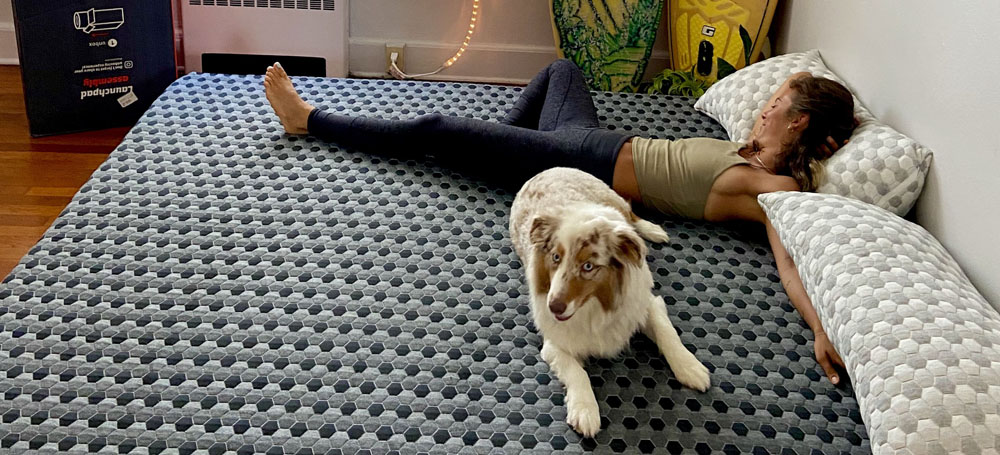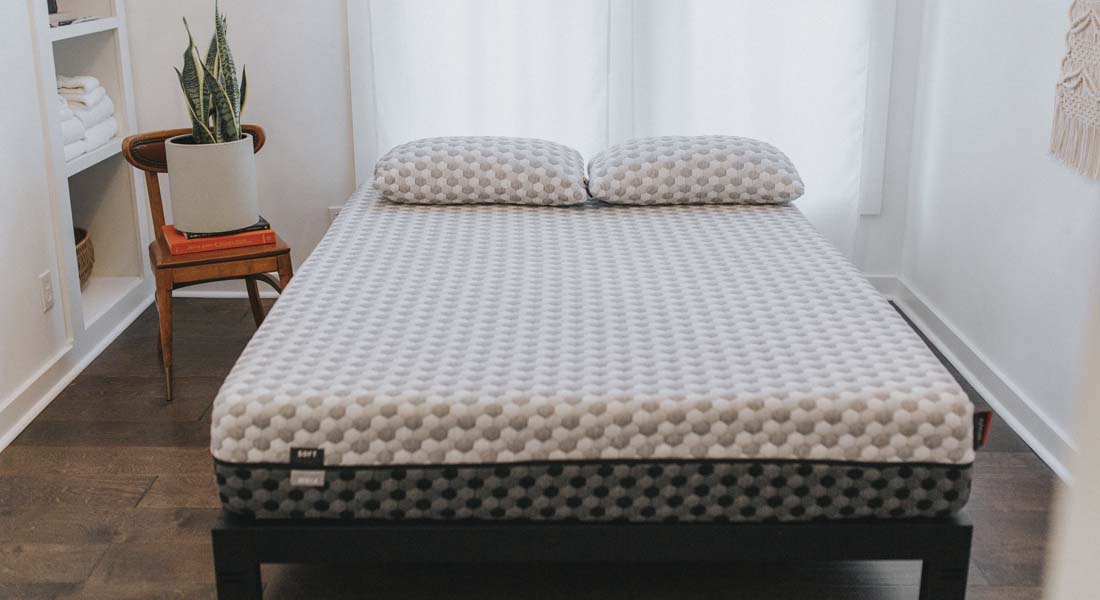As we rest, we recover from all the wear and tear we rack up throughout the day, most of which work occurs below the surface. At night, your cells turnover, your organs take a break, stress hormones dissipate, and you wake up feeling restored to your optimal being.
Most of us go to sleep and wake up around the same time every day and our bodies get comfortable in a groove. But sometimes in life, we’re forced to reset our sleep schedule and adjust our waking and sleeping hours. Maybe you got a new job, maybe you have to go back to school, or maybe you need to learn how to change a sleep cycle for the night shift. It may also be the case that you don’t have to, but want to learn how to fix a sleep schedule because you’ve heard the rumored benefits of keeping a regular bedtime routine.
We’ll dive into all those benefits, but first, we’re going to share some tips on how you can adjust your sleep schedule (without feeling like a zombie). Forcing yourself to wake up early or stay up later might sound like an impossible challenge at present, but you might just be surprised how quickly your body attunes itself to your new routine — and by how awesome you feel in return.
Resetting Your Sleep Schedule: Top Tips
There are all sorts of sleepers: early birds and night owls, those who can’t get enough shuteye and those who will stubbornly fight their body until it forcefully dozes off. Some people can fall asleep at the drop of a hat while others chase the pillow, tossing and turning all night. No matter what your unique profile is, learning how to fix a sleep schedule usually proves to be pretty challenging.
But these tips can help. When you need to reset your sleep cycle and teach your body a new time to power down, use these strategies to make the transition much easier:
Make Gradual Adjustments
You’re not going to become sleeping beauty overnight, nor is it encouraged to pull an all-nighter in order to reset your sleep schedule the following day. If you want to build a sustainable sleep pattern, get there by making slight adjustments to your standard habits.
For example, if you normally wind down around 11:00 PM, but a new job demands that you start waking up at 6:00 AM, you should make 10:00 PM your target bedtime in order to achieve the prescribed eight hours. Slowly start laying down 15 minutes earlier every night until you get closer to your golden goodnight time. Keep in mind that this also means you should start your nighttime routine a little earlier every evening as well.

Make Friends with Darkness
Let’s face it, no one likes to be alone in the dark. From an evolutionary standpoint, darkness could pose a serious danger, so it makes sense that we still actively try to avoid this situation — even though we’re completely safe in the 21st-century homes. It’s actually modern society’s technological advancements that now threaten our health by disturbing our sleep.
Televisions, laptops, computers, tablets, smartphones… digital screens are practically unavoidable in today’s day and age. But they emanate blue light that’s not only bad for our vision, but it makes our brain think that it’s still daytime. As you establish a nighttime routine, it’s wise to avoid blue light for at least two hours before bed.
Turn off the TV. Plug your phone into a charger located in the kitchen or somewhere away from your bed so you can’t scroll to infinity. Disconnect and tune back into yourself. Everyone finds a nightly ritual that works for them; maybe you like to read, journal, meditate or look at the stars. Doing this consistently helps signal “sleep time” to your brain and will make dozing off much easier.
Skip the Snooze
We can all be guilty of hitting that treasured snooze button in favor of just five more minutes. Some of us even set our alarm clocks early to accommodate one, two, or three snoozes because we desperately dread getting out of bed. Here’s the thing: falling back into half-awake slumber actually does you more harm than good, sending your brain mixed signals and tiptoeing at the start of a new REM cycle.
When that happens, you end up feeling groggier than you would have otherwise. It may be painful, but force yourself to wake up at the sound of the first alarm. If you give yourself a few minutes to adjust to your daytime mode, you might find that you’re not as tired as you initially felt. And the good news is, with a little bit of practice and consistency, soon you’ll be popping out of bed without the help of an electronic device.

Embrace the Morning Light
On the contrary, when it’s time to wake up, flood your brain with light signals to inhibit the release of melatonin, otherwise known as the sleep hormone. Melatonin is regulated by light; as dusk falls, the hormone level starts to spike, signaling symptoms of tiredness that eventually get you to hit the sheets. That’s why the phone in your hand in bed at night is not only a sleep distraction, its light is a sleep deterrent.
It might be a bright world out there, but allowing the morning sun to flood through your windows is a great way to flip the switch and jumpstart your system. Energy will come more naturally than if you were to wake up slowly, shielded by the darkness of blackout curtains.
Set Yourself up for Success
When you’re trying to fix your sleep schedule and force yourself to go to bed at an unnatural hour, every detail matters. You won’t want to lay down on a busted box spring that causes a stiff back, and when you do successfully slip into dreamland, there’s nothing worse than waking yourself up to a hot, sweaty mess.
That’s why it’s worth your while to invest in a copper mattress and bamboo sheets that will keep you cool, comfortable, and dry from hour one to hour eight. If sleep is a new priority, then nighttime comfort should be a close second.
Adjusting Your Sleep Schedule: How and Why
You do it all the time: stay up a little past bedtime to catch the end of your favorite show, indulge by sleeping in on the weekends, squeeze in a cat nap on days you’re exhausted. All of these are examples of micro-adjustments you might make to your sleep schedule on a regular basis.
The problem with that is that erratic sleeping patterns can have you feeling all out of sorts. You might not even notice this effect if inconsistent sleep has become a trademark of your lifestyle. You could be amazed by how much more you remember, how clearly you process information, and how creatively you think with a consistently full night of sleep beneath your belt.
Don’t just take our word for it. There are scientific studies that speak to the benefits of adjusting your sleep schedule to a regular routine, citing that irregular sleep patterns correlate to daytime drowsiness and fatigue.
Why Sleep Schedules Matter
As it turns out, regular bedtimes aren’t just for kids. Adults can benefit by fixing their sleep schedule because it helps with getting in touch with your circadian rhythm, or your body’s internal clock. It’s this clock that tells your body when it’s time to rest and when it’s time to wake up. The circadian rhythm is impacted by melatonin, which is the sleepy-time hormone your brain releases cued by light. When your body finds its natural rhythm, you can recognize when it’s time to call it a night, you fall asleep easily, and you wake up naturally feeling bright-eyed and bushy-tailed, ready to take on the day at full cognitive functioning.
That being said, the benefits of a well-established sleep pattern don’t necessarily come easy, per se. Most of us feel like a million bucks after waking up from a great night’s rest, but the key is consistently getting the sleep you need, not just the occasional weekend hibernation.
Spoiler alert: You’re going to feel tired as you experience the side effects of changing your sleep schedule. But once you push past a week or so of staring at the ceiling and feeling under-rested, you’ll start to reap all the positive benefits of better sleep.
According to WebMD, a routine sleep schedule may help prevent heart disease and cut your odds of diabetes, in addition to all the other positives it adds to your day-to-day experience. Layla has all the best advice for a good night’s rest and tips on how to fix sleep schedules so you can reset your system and get back to speed.



